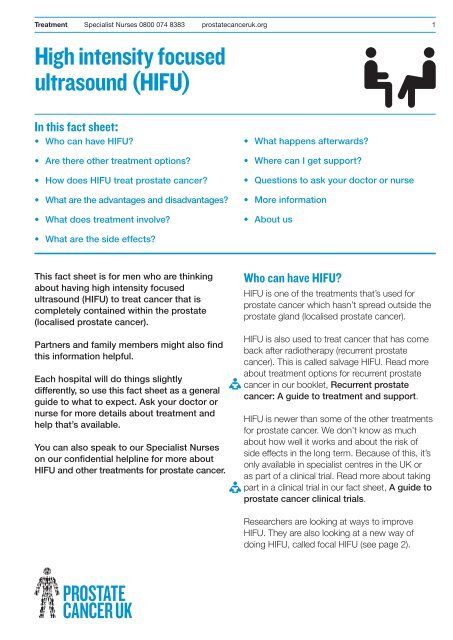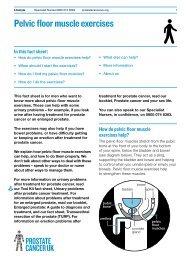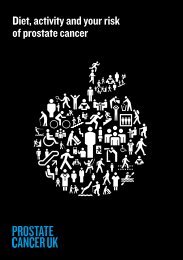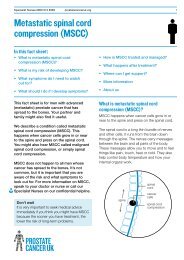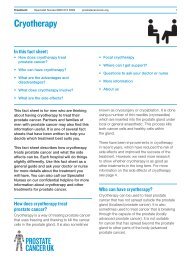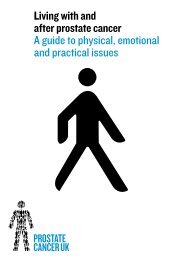High intensity focused ultrasound (HIFU) - Prostate Cancer Charity
High intensity focused ultrasound (HIFU) - Prostate Cancer Charity
High intensity focused ultrasound (HIFU) - Prostate Cancer Charity
- No tags were found...
You also want an ePaper? Increase the reach of your titles
YUMPU automatically turns print PDFs into web optimized ePapers that Google loves.
Treatment Specialist Nurses 0800 074 8383 prostatecanceruk.org2Are there other treatment options?You might have other treatment options forlocalised prostate cancer, such as:• active surveillance• watchful waiting• surgery (radical prostatectomy)• external beam radiotherapy (EBRT)• brachytherapy• cryotherapy (in specialist centres or clinical trials).Read more about all of these possible treatmentsin our Tool Kit fact sheets. Or speak to ourSpecialist Nurses on our confidential helpline.How does <strong>HIFU</strong> treat prostate cancer?<strong>HIFU</strong> heats and destroys cancer cells in theprostate. Pulses of <strong>ultrasound</strong> waves travelthrough the wall of the back passage (rectum)into the prostate gland. This <strong>ultrasound</strong> energycauses the prostate cells to heat up.Because the heat destroys both cancer cells andnormal prostate cells, the treatment is <strong>focused</strong> onthe prostate gland to avoid damaging other areas.<strong>High</strong> <strong>intensity</strong> <strong>focused</strong> <strong>ultrasound</strong>Unsure about your diagnosis andtreatment options?If you’ve got any questions about yourdiagnosis, ask your doctor or nurse. They willbe happy to explain your test results and talkwith you about your treatment options. It’simportant you feel you have enough time andall the information you need before makinga decision about treatment. We’ve gotinformation about diagnosis and treatmentsin our fact sheets and booklets and online.And you can speak to our Specialist Nurseson our confidential helpline.urethrabladderprostateglandrectum<strong>ultrasound</strong>wavesprobeFocal <strong>HIFU</strong>Some specialists are looking at a newerway of using <strong>HIFU</strong> called focal <strong>HIFU</strong>. Thismeans that <strong>HIFU</strong> is used to treat the areas ofthe prostate that contain the cancer, ratherthan treating the whole prostate gland. Earlyresearch suggests it might reduce the risk ofside effects compared to treating the wholeprostate gland, because less of the healthytissue is damaged. This is a new area ofresearch and more needs to be knownbefore it’s made widely available.
Treatment Specialist Nurses 0800 074 8383 prostatecanceruk.org3What are the advantagesand disadvantages?An advantage for one person might not be forsomeone else. Talk to your doctor or nurseabout your own situation.Advantages• <strong>HIFU</strong> has fewer risks than surgery, so it mightbe suitable for men with other health problems.• You only need a short hospital stay –less than 24 hours.• <strong>HIFU</strong> may be an option if the cancer comesback after treatment with external beamradiotherapy (EBRT). This isn’t the casewith all treatments.Disadvantages• In the UK, <strong>HIFU</strong> is only available in specialistcentres or as part of a clinical trial.• Compared with other treatments, we don’tknow as much about how well <strong>HIFU</strong> works inthe long term.• As with other treatments, there is a risk ofside effects including urinary problems anderectile dysfunction. See page 4 for moreabout side effects.What does treatment involve?Before the treatmentIf you have a large prostate gland, you mighthave hormone therapy to shrink it before starting<strong>HIFU</strong>. Your surgeon might also suggest anoperation called a transurethral resection of theprostate (TURP) before you have <strong>HIFU</strong>, to makethe prostate smaller. As with all treatments, thishas some side effects. Read more about TURPin our fact sheet, Transurethral resection of theprostate (TURP).On the morning of your treatment with <strong>HIFU</strong>you’ll be given an enema, to help you emptyyour bowels. This is a liquid medicine which isgiven directly into your back passage (rectum).You’ll be asked not to eat or drink for around sixhours before the <strong>HIFU</strong> treatment.TreatmentYou might have a general anaesthetic so thatyou are asleep during the treatment. Or youmight have a spinal or epidural anaesthetic(injection into your spine) so that you’re awakebut can’t feel anything in your lower body. Withthis, you may also be given some medicine (asedative) to make you feel sleepy.You will have a catheter inserted at the start ofthe procedure. A catheter is a thin tube that ispassed into your bladder, either through thepenis (urethral catheter) or through the wall ofyour abdomen (supra-pubic catheter), to drainurine out of the body.Then, to give the treatment, your surgeon willinsert a probe into your back passage (rectum).This probe gives out high <strong>intensity</strong> <strong>ultrasound</strong>waves, which are <strong>focused</strong> on an area of theprostate gland. The probe is surrounded by acooling balloon, to protect your back passagefrom the high temperatures. It takes up to threehours to treat the whole prostate gland.Going home after treatmentUsually, men go home on the same day as thetreatment. Your doctor or nurse will check thatyou’ve recovered from the anaesthetic and arefit to go home. You may have pain in the areabetween your testicles and back passage butyou’ll be given pain-relieving drugs to take athome. You might also get antibiotics to preventany possible infection and a medicine called alaxative to help you empty your bowels.Before you go home your doctor or nursewill show you how to look after your catheter.They’ll also give you an appointment to returnto hospital to have your catheter removed. Youwill need a catheter to help you urinate for upto two weeks after treatment. You might needa catheter for longer if you have <strong>HIFU</strong> afterradiotherapy. Read more about catheters inour Tool Kit fact sheet, Urinary problems afterprostate cancer treatment.
Treatment Specialist Nurses 0800 074 8383 prostatecanceruk.org4What are the side effects?Like all treatments, <strong>HIFU</strong> can cause side effects.These affect each man differently, and you mightnot get them all.The most common side effects are urinaryproblems and difficulty getting and keeping anerection (erectile dysfunction).You’re more likely to get side effects if youhave repeat <strong>HIFU</strong> treatment or if you havealready had other treatments for prostatecancer. This is because these treatments mighthave already caused some damage to the areaaround the prostate.Ask your doctor or nurse for more informationabout side effects. They should be able to showyou the results of the treatments they havecarried out and put you in touch with other menwho’ve had the treatment.Short-term side effectsThese can develop soon after your treatment.You might notice blood in your urine while thecatheter is in place. You might also notice somesmall pieces of prostate tissue in your urine forup to two months after your <strong>HIFU</strong> treatment.This is normal, but you should contact yourdoctor or nurse straight away if you are worriedor if you develop any new symptoms such aspain or a high temperature.<strong>HIFU</strong> can make your prostate gland swelltemporarily. This might make it hard to passurine for a short while after your catheter hasbeen removed. If you notice your flow of urinehas slowed down or you are unable to urinate,you should get treatment straight away. Contactyour doctor or nurse or go to your hospitalaccident and emergency (A&E) department.They might suggest a temporary catheter untilthe swelling has settled. This is a tube thatyou can use to drain urine from your bladderwhenever you need to go to the toilet. This iscalled self-catheterisation, and you can readmore about it in our Tool Kit fact sheet,Urinary problems after prostate cancertreatment. Some men may have longer-termproblems with a slow flow of urine (see below).Some men get a urine infection after treatment.If you have a urine infection, you might need tourinate more often and with less warning andyou might get a burning feeling when youurinate. Other signs of a urine infection includea high temperature, burning sensation or dark,cloudy or unpleasant smelling urine. Yourdoctor can prescribe antibiotics to treat aurine infection.Longer-term side effectsMost short-term side effects will settle downafter your <strong>HIFU</strong> treatment, but you can have laterand long-term side effects.Urinary problems<strong>HIFU</strong> can cause urinary problems. These includeleaking urine, and problems passing urine. Youmay have symptoms straight after treatment, orthey might develop some time later. Researchsuggests that if you have a large prostate, havinga TURP operation before <strong>HIFU</strong> treatment mightreduce the risk of having problems urinating.This is because the TURP operation removesany parts of the prostate that are pressing onthe tube which you pass urine through, makingit easier to urinate.Some men find it hard to urinate after thecatheter is removed. This can sometimes be alonger-term problem caused by the urethra orthe opening from the bladder getting narrower. Ifthis becomes a problem, you might be offered aminor procedure to stretch the narrowed area.Some men find they leak urine (urinaryincontinence) after <strong>HIFU</strong>. This is more likely ifyou have <strong>HIFU</strong> after external beam radiotherapy.You might find that you leak a little bit when youcough, sneeze or exercise. Or you may need togo more often or more urgently.
Treatment Specialist Nurses 0800 074 8383 prostatecanceruk.org5Talk to your doctor, nurse or GP if you have anyof the side effects described above. There area number of things that can help you manageurinary problems, including lifestyle changes,pelvic floor muscle exercises and treatments.Your doctor or nurse may be able to suggestsome practical things you can do to makethings easier. They may also refer you to anNHS continence service, run by nurses andphysiotherapists who specialise inurinary problems.Read more about how to manage urinaryproblems and how to get help in our Tool Kitfact sheets, Urinary problems after prostatecancer treatment and Pelvic floor muscleexercises. You can also speak to our SpecialistNurses on our confidential helpline.Sexual problemsSome men have problems getting an erection(erectile dysfunction) after <strong>HIFU</strong> treatment. <strong>HIFU</strong>can damage the blood vessels and nerves thatcontrol erections. There are treatments availableto help manage erection problems.Also after <strong>HIFU</strong>, some men ejaculate less semen,or no semen at all. But they can still orgasm(climax). This could mean that you can’t havechildren after treatment. If you are planning tohave children, you might be able to store yoursperm before the operation for use in fertilitytreatment. If this is important to you, ask yourdoctor or nurse if this option is available locally.If you’ve had a TURP operation before <strong>HIFU</strong>,you may find that when you orgasm, the sementravels backwards into the bladder rather thanout through the penis. It’s then passed out ofthe body the next time you urinate. This is calledretrograde ejaculation. It’s not harmful andshouldn’t affect your enjoyment of sex, but itmight feel quite different from the orgasms youare used to.Talk to your doctor or nurse if you have anysexual problems. They can discuss with youpossible treatment options for erection difficultiesand they can prescribe treatment free on theNHS. You can also ask your doctor, nurse orGP to refer you to your local erectile dysfunction(ED) clinic.Read more about this in our booklet, <strong>Prostate</strong>cancer and your sex life. You can also call ourSpecialist Nurses on our confidential helpline.Bowel problemsSome men get a burning sensation or somebleeding from the back passage after<strong>HIFU</strong> treatment.Very rarely, <strong>HIFU</strong> causes a hole (fistula) betweenthe urethra and the back passage. This affectsless than 1 in 100 men (1 per cent). It is morecommon, but still rare, for men who have alreadyhad radiotherapy. Recent studies suggest thatabout 3 out of 100 men (3 per cent) whohave <strong>HIFU</strong> after external beam radiotherapydevelop a fistula.Sometimes pain and infections of the urethracan be early signs of a fistula, although thesecan also be caused by something else. Contactyour doctor or nurse if your urine is strongsmelling or you have a temperature, whichcould be signs of an infection. Discharge fromthe urethra or discharge or diarrhoea from theback passage may also be signs of a fistula. Ifyou develop a fistula, you will need to have anoperation to repair the hole.
Treatment Specialist Nurses 0800 074 8383 prostatecanceruk.org6What happens afterwards?After <strong>HIFU</strong> you will have regular appointmentswith your doctor or nurse to check your PSAlevel and monitor any side effects.Your PSA is likely to reach its lowest level a fewmonths after treatment. If your PSA doesn’t fallor if it starts to rise again, you might need tohave a biopsy to see if there are cancer cells inthe prostate gland. You might also have scans tofind out if the cancer has spread to other partsof the body. These could be CT, MRI or bonescans, for example. If the biopsy or scans showup prostate cancer, your doctor or nurse will talkto you about further treatment options.Where can I get support?Not everyone wants or needs the same kindof support, but you might find some of theinformation below useful. Your partner andfamily may also need support in emotional andpractical ways. This information may also behelpful for them.Family and friendsSome men get all the back-up they need fromtheir family and friends. Get things off your chestby talking to a partner, friend or family. Explaininghow you feel can help those close to youunderstand and give you support if you want it.Your doctor or nurseTalk to your specialist nurse, doctor or otherhealth professionals involved in your care.They should be able to answer any questionsor concerns you might have, as well asproviding support.You and those close to you can also speakto one of our Specialist Nurses by calling ourconfidential helpline. They can give you a betterunderstanding of your treatment optionsand the emotional effects of cancer.CounsellingSome people find it easier to talk to someonethey don’t know. Counsellors are trained to listenand can help you to find your own answers. YourGP may be able to refer you to a counsellor oryou can find one yourself. The British Associationfor Counselling and Psychotherapy hasinformation about counselling and counsellorsin your area.One-to-one support serviceYou might find it useful to talk to someone withsimilar experiences, through our one-to-onesupport service. Our support volunteers are allpersonally affected by prostate cancer, either asa man with prostate cancer or a family member.They are trained to listen and offer support overthe phone.To arrange to speak to a volunteer, call ourSpecialist Nurses on our confidential helpline.OnlineIf you have access to the internet, join our onlinecommunity, where men and their families sharetheir experiences of prostate cancer. It’s free andonly takes a few minutes to register. Visit ourwebsite at prostatecanceruk.org to sign up.Local support groupsGet in touch with your local prostate cancersupport group. They can be a good way to meetpeople with similar experiences. They’re oftenset up by local health professionals, or by peoplewho have experience of prostate cancer.Meetings are usually informal and give youa chance to find out about other people’sexperiences as well as discussing your ownthoughts and concerns. Many support groupsalso welcome partners, friends and relatives.For details, visit prostatecanceruk.org or call ourSpecialist Nurses on our confidential helpline.
Treatment Specialist Nurses 0800 074 8383 prostatecanceruk.org7Questions to ask your doctor or nurseYou may find it helpful to keep a note of any questions you haveto take to your next appointment.Will I need a TURP before my <strong>HIFU</strong> treatment?Will I need hormone therapy before my <strong>HIFU</strong> treatment?What are my chances of short-term or long-term side effects with this treatment?
Treatment Specialist Nurses 0800 074 8383 prostatecanceruk.org9Notes
Treatment Specialist Nurses 0800 074 8383 prostatecanceruk.org10More informationBladder and Bowel Foundationwww.bladderandbowelfoundation.orgHelpline 0845 345 0165Information and support for all types of bladderand bowel problems.British Association for Counsellingand Psychotherapywww.itsgoodtotalk.org.ukPhone 01455 883300Information about counselling and details oftherapists in your area.<strong>Cancer</strong>Help UKwww.cancerhelp.org.ukNurse helpline 0808 800 4040<strong>Cancer</strong> Research UK’s patientinformation resource.Macmillan <strong>Cancer</strong> Supportwww.macmillan.org.ukHelpline 0808 808 00 00Practical, financial and emotional support forpeople with cancer, their family and friends.Maggie’s Centreswww.maggiescentres.orgPhone 0300 123 1801A network of drop-in centres for cancerinformation and support. Includes an onlinesupport group.National Institute for Health and CareExcellence (NICE)www.nice.org.ukPhone 0845 003 7780Guidelines for care and for the use of treatmentsand procedures on the NHS in England andWales. Includes specific guidelines for <strong>HIFU</strong>and focal <strong>HIFU</strong>.Sexual Advice Associationwww.sda.uk.netHelpline 020 7486 7262Treatment information for erectile difficultiesand other sexual problems.
Treatment Specialist Nurses 0800 074 8383 prostatecanceruk.org11About us<strong>Prostate</strong> <strong>Cancer</strong> UK fights to help more mensurvive prostate cancer and enjoy a better life.This fact sheet is part of the Tool Kit. You canorder more Tool Kit fact sheets, including anA-Z of medical words, which explains some ofthe words and phrases used in this fact sheet.Tell us what you thinkIf you have any comments about ourpublications, you can email:literature@prostatecanceruk.orgDownload and order our free publications fromour website at prostatecanceruk.org or call uson 0800 074 8383.At <strong>Prostate</strong> <strong>Cancer</strong> UK, we take great care toprovide up-to-date, unbiased and accurate factsabout prostate cancer. We hope these will addto the medical advice you have had and help youto make decisions. Our services are not intendedto replace advice from your doctor.References to sources of information used in theproduction of this fact sheet are available atprostatecanceruk.orgThis publication was written and edited by:<strong>Prostate</strong> <strong>Cancer</strong> UK’s Information TeamIt was reviewed by:• Hashim U Ahmed, MRC Clinician Scientistand Clinical Lecturer in Urology, UniversityCollege London• BH Baxter, Clinical Nurse Specialist, RoyalDerby Hospital, Derby• Mr Simon Brewster, Consultant UrologicalSurgeon, Churchill Hospital, Oxford• <strong>Prostate</strong> <strong>Cancer</strong> UK Specialist Nurses• <strong>Prostate</strong> <strong>Cancer</strong> UK Volunteers
Speak to ourSpecialist Nurses0800 074 8383*prostatecanceruk.orgDonate today – help others like youDid you find this information useful? Would you like to help others in yoursituation access the facts they need? Every year, 40,000 men face a prostatecancer diagnosis. Thanks to our generous supporters, we offer informationfree to all who need it. If you would like to help us continue this service, pleaseconsider making a donation. Your gift could fund the following services:• £10 could buy a Tool Kit – a set of fact sheets, tailored to the needs of eachman with vital information on diagnosis, treatment and lifestyle.• £25 could give a man diagnosed with a prostate problem unlimited time totalk over treatment options with one of our Specialist Nurses.To make a donation of any amount, please call us on 0800 082 1616,visit prostatecanceruk.org/donations or text PROSTATE to 70004*.There are many other ways to support us. For more details please visitprostatecanceruk.org/get-involved**You can donate up to £10 via SMS and we will receive 100% of your donation.Texts are charged at your standard rate. For full terms and conditions and moreinformation, please visit prostatecanceruk.org/terms© <strong>Prostate</strong> <strong>Cancer</strong> UK July 2013To be reviewed July 2015Call our Specialist Nurses from Mon to Fri 9am - 6pm, Wed 10am - 8pm* Calls are recorded for training purposes only.Confidentiality is maintained between callers and <strong>Prostate</strong> <strong>Cancer</strong> UK.<strong>Prostate</strong> <strong>Cancer</strong> UK is a registered charity in England and Wales (1005541) and in Scotland (SC039332). Registered company number 2653887.2495 HIF/MAR14


